Kerry says aims to close 'important gaps' in Iran nuclear talks
Updated: 2013-11-09 01:32
(Agencies)
|
||||||||
![Israeli Prime Minister Benjamin Netanyahu delivers a statement to the media after meeting U.S. Secretary of State John Kerry at Ben Gurion Airport near Tel Aviv November 8, 2013. [Photo/Agencies] Kerry says aims to close 'important gaps' in Iran nuclear talks](../../attachement/jpg/site1/20131108/180373cf843213e764eb0c.jpg) |
|
Israeli Prime Minister Benjamin Netanyahu delivers a statement to the media after meeting US Secretary of State John Kerry at Ben Gurion Airport near Tel Aviv November 8, 2013. [Photo/Agencies] |
ISRAELI FURY
The negotiations in Geneva involve Iran and the permanent members of the U.N. Security Council - the United States, Russia, China, France and Britain - plus Germany. While Iran has in the past suggested broadening the agenda to include issues like Afghanistan, Iraq or Syria, the six powers have insisted on sticking to Tehran's nuclear activity.
The Islamic Republic, which harbours some of the world's largest oil and gas reserves, wants the six powers to lift increasingly tough restrictions that have slashed its daily crude sales revenue by 60 percent in the last two years.
Iran and the powers are discussing a partial nuclear suspension deal covering around half a year. If a preliminary deal is nailed down, it would only be the first stage in a process involving many rounds of intricate negotiations in the next few months aimed at securing a permanent agreement.
One of the main ideas under consideration is the disbursement in instalments of up to around $50 billion of Iranian funds frozen in foreign accounts for many years. Other ideas included temporarily relaxing restrictions on Iran's trade in petrochemicals and precious metals.
Both sides have limited room to manoeuvre, as hardliners in Tehran and in Washington could sharply criticise any agreement they believed went too far in offering concessions.
One Western diplomat told Reuters that Israel's fury at the proposed deal might actually make it easier for Rouhani to sell the interim deal to sceptics in Iran's powerful security and clerical elites who are wary of US overtures to Tehran 33 years after Washington broke off diplomatic relations.
Ashton's spokesman Michael Mann told reporters that there was no deal yet and "very intense work is continuing."
France's Laurent Fabius, the first of the Western foreign ministers to arrive in Geneva, said the talks were difficult. "There is progress, but nothing is concluded yet," he said.
Tehran wants respite from a panoply of international sanctions choking its economy. The United States has said world powers will consider some sanctions relief, while leaving the complex web of US, EU and U.N. restrictions in place, if Iran takes verifiable steps to rein in its nuclear programme.
Israel has argued against sanctions relief until Iran has dismantled its enrichment facilities. "The Iranians are walking around very satisfied in Geneva - as well they should be, because they got everything and paid nothing," Netanyahu said.
PHASED SANCTIONS RELIEF?
US President Barack Obama said on Thursday that the world could slightly ease up on sanctions against Iran in the early stages of negotiating a comprehensive permanent deal.
"There is the possibility of a phased agreement in which the first phase would be us ... halting any advances on their nuclear programme ... and putting in place a way where we can provide them some very modest relief, but keeping the sanctions architecture in place," he said in an interview with NBC News.
Kerry said earlier that Tehran would need to prove its atomic activities were peaceful, and that Washington would not make a "bad deal, that leaves any of our friends or ourselves exposed to a nuclear weapons programme".
"We're asking them to step up and provide a complete freeze over where they are today," he said on Thursday.
In Geneva, Iranian Deputy Foreign Minister Abbas Araqchi was cautious on the chances of an accord. "Too soon to say," he told reporters on Thursday after the first day of talks. "I'm a bit optimistic. We are still working. We are in a very sensitive phase. We are engaged in real negotiations."
Lending urgency to the need for a breakthrough was a threat by the US Congress to pursue tough new sanctions on Iran.
Obama has been urging Congress to hold off on more punitive steps to isolate Iran, demanded by Israel, to avoid undermining the fragile diplomatic opening with the Islamic Republic.
But many US lawmakers, including several of Obama's fellow Democrats, believe tough sanctions brought Iran to the negotiating table in the first place and that more are needed to discourage it from diverting enrichment toward bombmaking.
Zarif, Tehran's chief negotiator, suggested a partial suspension of Iran's enrichment campaign might be possible - a concession Iran ruled out before Rouhani's landslide election.
Zarif said he hoped the two sides would agree on a joint statement on Friday stipulating goals to be reached "within a limited period of time, hopefully in less than a year", and a series of reciprocal actions they would take "to build confidence and address their most immediate concerns".
Iran and the United States have had no diplomatic ties since soon after the 1979 Islamic Revolution that overthrew the US-backed monarchy, and their mutual mistrust and enmity have posed the biggest obstacle to any historic nuclear settlement.
- Kerry to join Iran nuclear talks in bid to reach deal
- World powers to consider sanction relief for Iran: US
- Iran calls for nuclear weapon elimination
- Iran urges to ditch pressure policy before nuke talks
- Iran says sanction relief to take time
- Iran 'not optimistic' on ongoing nuclear talks
- Kerry: US won't allow attacks on Mideast partners
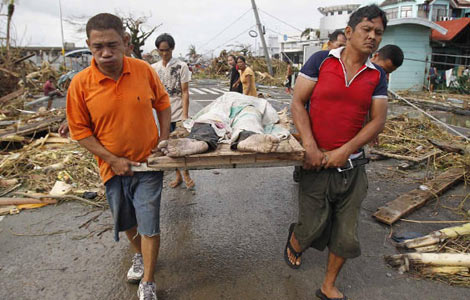
 Typhoon kills at least 1,200 in Philippines, says Red Cross
Typhoon kills at least 1,200 in Philippines, says Red Cross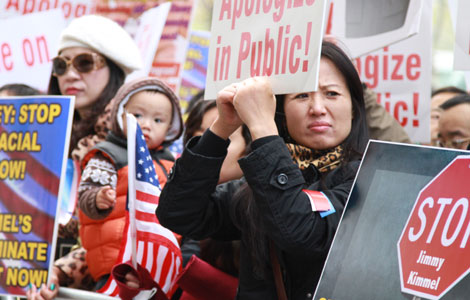
 Chinese Americans protest Kimmel joke in NYC
Chinese Americans protest Kimmel joke in NYC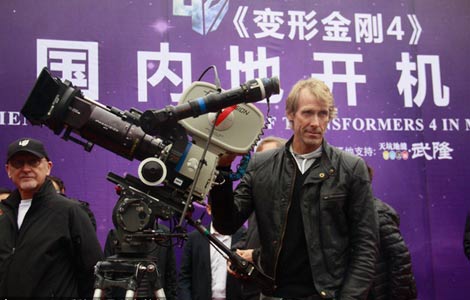
 Brand China in leading role on Transformers set
Brand China in leading role on Transformers set
 Market moves to modern mall as Lhasa safeguards the past
Market moves to modern mall as Lhasa safeguards the past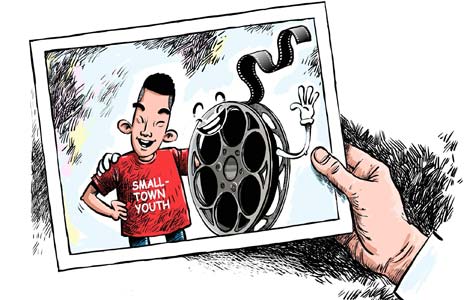
 In small-town China, movies are big
In small-town China, movies are big
 A gathering of gourmets
A gathering of gourmets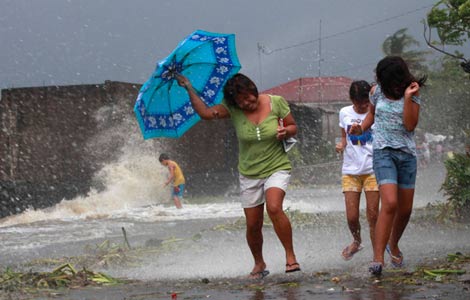
 Super typhoon Haiyan slams into Philippines
Super typhoon Haiyan slams into Philippines
 50 arrested at LA protest over Wal-Mart wages
50 arrested at LA protest over Wal-Mart wages
Most Viewed
Editor's Picks

|

|

|

|

|

|
Today's Top News
CPC session begins to set reform agenda
US Oct jobless report paints dim picture
Obama's approval rating plunges to 41%
China's discipline agency targets holiday luxuries
Chinese land reform at crucial stage
Senior official at Cosco under investigation
Li appoints advisers to key govt think tank
Taxi driver is lone suspect in Taiyuan bomb blasts
US Weekly

|

|







